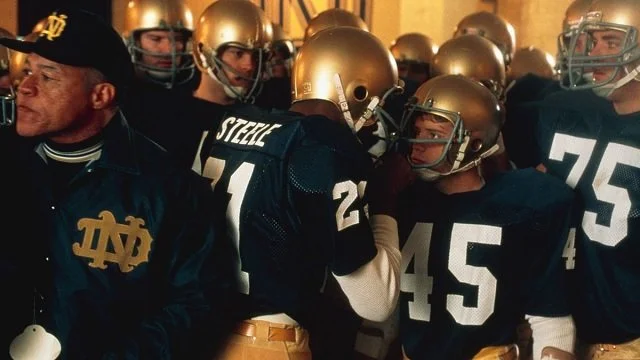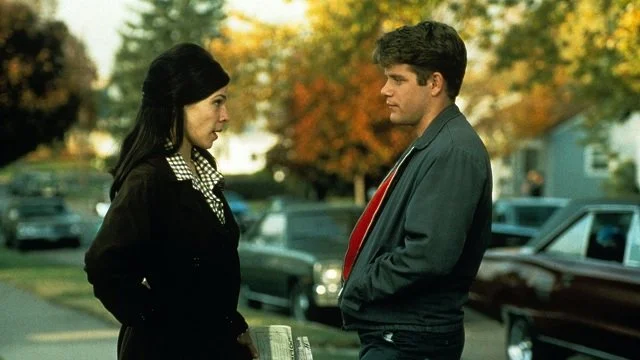Rudy and the Lie of the Lucky Underdog
The 1993 film Rudy is one of the most beloved sports movies of all time. It’s been quoted endlessly, played in locker rooms before big games, and held up as the gold standard of “never give up” inspiration.
But once you step back from the emotional soundtrack and the triumphant slow clap, it becomes clear that Rudy might be one of the worst underdog stories ever told; not because it’s badly made, but because it teaches the wrong lesson.
In a nutshell, the film’s message isn’t about perseverance or excellence. It’s about wishful thinking rewarded by chance. And that makes Rudy a tale of delusion instead of determination.
Screen cap: Tri Star Pictures
Rudy Ruettiger’s story hits all the familiar beats: a working-class kid from nowhere dreams of playing football for Notre Dame despite lacking size, talent, and academic standing. Through grit and persistence, he finally gets accepted, joins the team as a walk-on, and, in the climax, gets to take part in one play in a single game.
The crowd roars. His teammates carry him off the field. The credits roll. The audience gets emotional catharsis.
But here’s the problem: Rudy doesn’t achieve his dream through his own agency. He’s not rewarded for his mastery of a skill. Instead, he’s rewarded because other people: coaches, players, and administrators; decide to make him a symbol. His success hinges on others’ sentimentality, not his competence.
The word for that kind of outcome is luck.
Screen cap: Tri Star Pictures
Rudy’s story is often presented as proof that hard work pays off. Yet in actualty, his one moment of victory happens because of a chain of unpredictable, uncontrollable events. His fellow players lobby to get him in the final game. Both teams play so as to give Notre Dame a comfortable lead. And the coach decides to put him on the field.
That’s a textbook black swan event: a rare convergence of circumstances that cannot be repeated or planned for. And it landed in Rudy’s lap.
The average person watching Rudy cannot reasonably imitate what he did and expect similar results. You can work as hard as Rudy, study as diligently, and hustle just as long, but if the people in charge don’t take pity on you, your outcome will be entirely different.
Screen cap; Tri Star Pictures
Hollywood wants you to believe otherwise because the underdog narrative is emotionally satisfying. But if you model your life on it, you’re setting yourself up for disappointment.
The danger of Rudy lies in how it redefines success as external validation. Rudy doesn’t win because he becomes a better player or finds a way to contribute to the team. He wins because he’s chosen as a living embodiment of perseverance that others project their emotions onto. In other words, he becomes their mascot.
Screen cap: Tri Star Pictures
In the end, Rudy is not celebrated for what he did, but how others felt about him.
That’s the real message buried under the cheering and tears: Don’t improve, just hang around until someone takes pity on you. Be the symbol of hard work, not the reality of achievement. It’s sentimental poison disguised as inspiration.
So, what does real winning behavior look like?
To find out, let’s contrast Rudy with genuinely instructive underdog stories whose protagonists change themselves and their environments through deliberate, intelligent effort.
The athlete who studies the game to compensate for physical limits
the entrepreneur who analyzes market gaps and innovates
the writer who refines his craft until skill turns into mastery.
Those are replicable models. They show a pattern of effort linked to measurable improvement.
Here’s the formula: Identify a goal, learn how excellence is defined in relation to it, apply consistent effort guided by feedback, and repeat.
Rudy doesn’t do any of that. His dream is disconnected from reason or process. Nor does he grow strategically; he just persists blindly until other people gift him what he wants.
Screen cap: Tri Star Pictures
There’s a subtle but important difference between perseverance and obstinacy. Perseverance means applying sustained effort toward a goal with evaluation and adaptation. Obstinacy means refusing to change course even when logic and evidence say otherwise. AKA trying the same thing over and over again while expecting a different result.
Rudy’s entire arc celebrates obstinacy. He’s told repeatedly that he doesn’t have the size, speed, or skill. He never finds a niche where his effort produces proportional results. He just keeps pushing the same boulder up the same hill until the fates take pity and let him get over the top.
In the real world, that’s a recipe for tragedy.
Screen cap: Tri Star Pictures
It’s no coincidence that Rudy came out in the early 1990s, at the height of America’s self-esteem movement. Gen Y kids were told they were all special and that success was a moral right rather than a measurable outcome. Hollywood’s message factories were more than happy to echo the same sentiment: Believe hard enough, and the world will bend to your will.
But belief without strategy is nothing. The cosmos doesn’t rearrange itself to fulfill the dreams of the persistent; it rewards those who understand its rules and master them.
Rudy turns that truth on its head. It tells people to act without understanding, to believe without reason, and to mistake sympathy for success.
That’s not to say that hard work doesn’t matter. Rudy’s effort, discipline, and heart are all admirable qualities. But those qualities only become transformative when paired with reason and adaptability.
The winning pattern isn’t “work hard no matter what.” That’s a Boomer platitude.
Instead, work hard in ways that create predictable, replicable results.
If you’re a writer, winning takes studying story structure, learning audience expectations, and building a platform. And as with any endeavor, it means consistently improving measurable metrics.
Persistence is the multiplier, not the foundation. You still need a system to scale.
Ultimately, Rudy reflects Hollywood’s favorite lie: that success comes from feeling hard enough, not from mastering a process. The movie celebrates the catharsis of recognition over the substance of growth. It asks us to weep for a man who shouldn’t have won but was applauded anyway.
In the final analysis, audiences like Rudy because it tells them what they want to hear: that if you suffer long enough, someone will notice and come help you. But life isn’t a fairy tale written by a studio. In the real world, effort without intelligence leads to exhaustion, and belief unexamined by reason is self-deception.
If you want to find true inspiration, look to stories in which cause and effect make sense. The boxer who studies his opponent and strategizes accordingly. Or a saint who conquers his passions through ordered will. That’s what real underdog success stories do. They don’t wait for the world to pity them; they understand it deeply enough to act effectively within it.
Rudy will always move audiences because it flatters emotion. But emotion doesn’t win championships, build businesses, or save souls. Applied intellect does. Virtue does. Yes, grace perfects those capacities, but only if we exercise our intellect and will in cooperation with it.
So if you take one lesson from Rudy, let it be this: Don’t wait for your coach, your boss, or the crowd to notice you. Don’t test the Almighty by counting on a miracle. Instead, build systems. Learn the logic behind the results you want. Then apply effort to the point that success becomes inevitable, not accidental.
Rudy got his moment by betting on a black swan. Make up for what his plan lacked, and you won’t have to.
The highly anticipated crowdfunder for Book 3 in my record-breaking Arkwright Cycle goes live next month! Don't miss a single insider update, exclusive perk, or exciting stretch goal. Follow the campaign now!
Brian Niemeier is a best-selling novelist, editor, and Dragon Award winner with over a decade in newpub. For direct, in-person writing and editing insights, join his Patreon.







